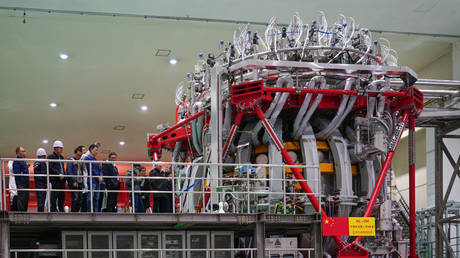ARTICLE AD BOX
A commercial ‘artificial sun’ has achieved its first plasma discharge, the developer says
The Chinese privately run fusion company Energy Singularity has built the world’s first fully high-temperature superconducting tokamak, and used it to produce plasma, state media outlets have reported, citing the firm.
The creation of the device, dubbed HH70 and located in Shanghai, is seen as a major step in the development of fusion technology to potentially generate clean energy.
A tokamak is a doughnut-shaped confinement device able to contain the plasma so its temperature can be raised to replicate conditions similar to those in the Sun. Its goal is to create a safe and almost limitless supply of electricity. The devices are often referred to as “artificial suns.”
The technology uses extremely high temperatures produced by fusion reactions, in which hydrogen atoms are fused together to become helium, releasing vast quantities of energy. Tokamaks, which are large and expensive-to-build machines, are able to create magnetic fields that help contain the particles within the plasma.
Read more ‘Artificial Sun’ hits record temperature
‘Artificial Sun’ hits record temperature
According to the developers, as cited by Chinese media, the HH70 tokamak is smaller and cheaper to assemble than its predecessors. The device uses a magnetic system made from high-temperature superconducting material, commonly known as REBCO (Rare Earth Barium Copper Oxide).
It can reportedly be manufactured on a large scale, reducing the cost of Energy Singularity’s tokamaks. Moreover, the HH70 device, according to the company, is only 2% the size of conventional tokamaks – providing a major advantage in the race to produce a commercially viable device.
Fusion reactors’ performance is commonly measured using the Q value, which represents the ratio of energy generated to the input energy required to keep the reaction going. Currently, the highest Q value obtained by a tokamak is 1.53.
Energy Singularity has reportedly pledged to build a next-generation tokamak by 2027, with its technology demonstrator to be completed by the end of the decade. The company is aiming to build “artificial suns” with a Q value of 10.
.png)
 5 months ago
2
5 months ago
2








 English (US)
English (US)